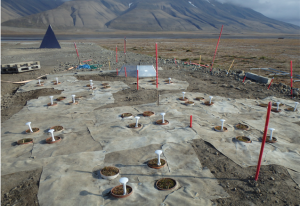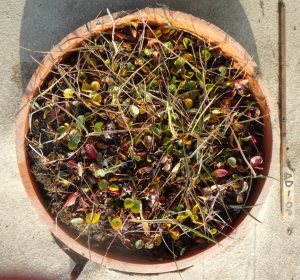Research question
1) How does late-season temperature and moisture influence senescence?
2) How long is green vegetation available under different temperature and moisture regimes?
Project description

The tundra ecosystem in Svalbard is characterized by some of the fastest environmental shifts resulting from climate change. In recent years, increases in biomass of vegetation available for Svalbard reindeer has been correlated with increased temperatures in summer, which may mean more food for Svalbard reindeer. Although increases in early-season production of vegetation with increasing temperatures is well documented, the effects of late-season warming on senescence of key forage for Svalbard reindeer (i.e., the duration of availability of nutritious food) is still unknown. We aim to evaluate how key forage for Svalbard reindeer respond to gradients of heating in the late summer and throughout the growing season.
The project involves
We have an experimental garden at the Gamle Nordlysstasjonen where we implement experimental heating of vegetation extracted from the tundra of Adventdalen. Using open-top chambers (OTCs) and direct heating devices, we expose vegetation to a gradient of heating temperatures, including “extreme” heating, based on climate change predictions of Svalbard. Throughout the summer, we monitor changes in senescence of vegetation relative to heating treatments on a weekly basis at our experimental garden.
 Starting date/period: Jul 04, 2022 – Sep 30, 2022
Starting date/period: Jul 04, 2022 – Sep 30, 2022
Experience/skills to be acquired
Students will gain knowledge on experimental design and become familiar with techniques in measuring plant characteristics. Also, they will learn plant identification of common species of Svalbard. Finally, students will gain experience with working outdoors, in an Arctic environment.
Involvement
We are seeking assistance with collecting measurements of plant senescence. Work typically entails 6-8 hours of data collection for one to two days each week.
Prerequisites
Participants must be able to work outdoors in inclement weather and be able to take detailed notes for data collection.
Interested in this project or need more info? Contact:
Samantha Dwinnell (samanthad@unis.no)
Project number: 21
